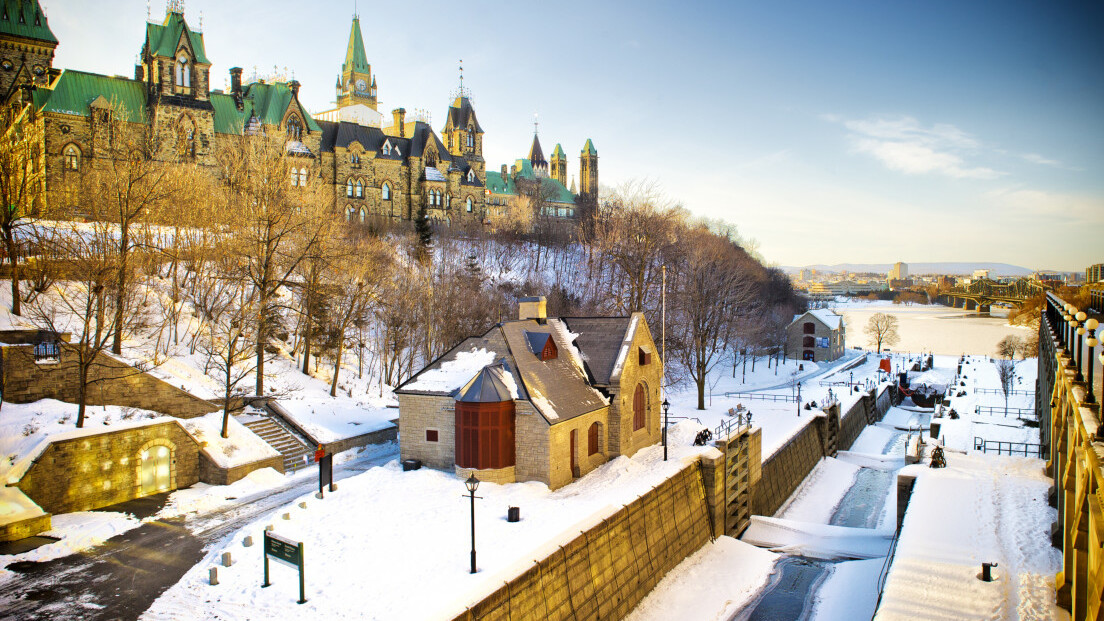
If you’re not from Canada, you might be surprised to learn that the capital of the Great White North isn’t Toronto. It’s Ottawa.
This is one mistake that any Canadian would tell you they’ve heard more times than they’d like to admit. Yet, in many ways, it could be argued that the same misunderstanding goes for the country’s tech capital as well.
Time and time again, Toronto beats out Ottawa on global and national rankings for best tech hub — with Ottawa, in some cases, failing to even make the list.
But while Toronto’s tech ecosystem is undeniably worth boasting about, what most people don’t recognize is that less than two decades ago, it was Ottawa that earned the nickname “Silicon Valley North.”
The point is, despite whichever city is Canada’s true tech capital, Ottawa seldom gets the recognition it deserves. It claims a richer tech history than any other Canadian city, and it shows in the new startups and technology it’s producing. That’s why we’ve decided to take a look at the realities of Canada’s ‘O.G.’ tech hub.

An overlooked history of tech talent
In much the same way that Silicon Valley built its tech prowess on a foundation of large semiconductor companies, Ottawa built its own on the back of telecom giants. Over the years, the city has played home to Mitel, Newbridge Networks, JDS Uniphase, and — most importantly — Nortel, which at its peak employed 94,500 people worldwide, with 25,900 in Canada alone.
However, when the dot-com bubble burst, shuttering Nortel in the early 2000s, large swaths of highly-skilled employees were left out on the street. But while the telecom giant disappeared, the technical labor force did not.
To this day, Ottawa’s capital region boasts a total ICT workforce of nearly 80,000 people, or 11.2 percent of the city’s total workforce — the highest tech-labor concentration in Canada, and more than three times the US average.
Additionally, the city’s four accredited universities churn out roughly 25,000 STEM graduates per year. But there’s still a huge demand for more.
There are now more than 2,000 tech-related companies in Ottawa, with multinationals like Nokia, Ericsson, Apple, and Amazon swooping in and competing against startups for talent. This has caused a formidable challenge for the city’s entrepreneurs, which, as summarized by journalist Tracey Lindeman, is: “That Ottawa needs more mid-career talent, which is a demographic crucial to scaling tech startups into profitable companies.”
As such, although salaries may be more affordable in Ottawa than in other cities, local and foreign entrepreneurs in Canada’s capital will likely have to pay a premium if they want to fill their job openings.
Nevertheless, considering the city’s low cost of living compared to other cities like Toronto or Vancouver, more developers and engineers could end up flocking to Ottawa to meet the demand for talent as the city continues to rebuild its brand as a tech hub.
A few different pockets of startup activity
Judging by the numbers, the amount of tech talent in Ottawa is unmistakably impressive; however, it can sometimes be hard to tell because it is scattered across the sprawling city. Ottawa is geographically larger than Toronto, Montreal, Vancouver, Edmonton, and Calgary combined, which has led to startup activity being kindled in disparate parts of the capital.
For entrepreneurs and investors, this comes as both a blessing and a curse. On one hand, it demonstrates that an entrepreneurial spirit pervades the entire city. At the same time, it makes it harder to benefit from the chance encounters and cross-pollination of ideas that make other, smaller hubs like San Francisco or Toronto so successful.
Currently, Ottawa’s tech and startup activity can be broken down into three main regions:
Kanata
The most historic part of Ottawa’s tech scene can be found just outside the city in a suburb called Kanata, which was — and still is — the epicenter of Ottawa’s tech leadership. It is home to Canada’s largest technology park, Kanata North, which accounts for the highest concentration of tech companies in the entire capital region.
Among the park’s more than 500 companies are global tech leaders like Juniper Networks, HP, and Cisco, as well as successful homegrown startups like Interset, Embotics, and Fusebill.

One of Kanata North’s biggest focal points is L-SPARK, led by Executive Managing Director Leo Lax. The accelerator was launched in 2014 with support from Wesley Clover, the global investment group of serial entrepreneur Sir Terry Matthews, as well as Canada’s National Research Council. It recently launched new accelerator program with BlackBerry as well.
Other notable organizations at Kanata North include the Ottawa branch of global early-stage startup accelerator Founder Institute, the “sketch-to-scale” engineering design shop Flex (formerly Flextronics), and the Kanata North Business Association, which represents and advocates for the best interests of the community.
Downtown / ByWard Market
While Kanata has the largest cluster of tech companies in total, an increasing number of startups are starting to choose to set up shop in the main part of the city, where it’s easier to get around and closer to the city’s main universities.
For example, Shopify, the poster child of Ottawa’s startup success, and other notable success cases, such as Klipfolio, are headquartered downtown. There are also the popular coworking spaces Impact Hub and TheCodeFactory, and Toronto-based accelerator OneEleven, which just expanded to Ottawa earlier this year.
To the east, just on the other side of the Rideau Canal — which freezes into the world’s largest naturally frozen ice skating rink, and which people use to skate to work in the winter — is ByWard Market. This area is also home to a significant number of startups, and right next to the University of Ottawa, which helps build startups through its Startup Garage incubator and ENACTUS entrepreneurship program.
Another ten minutes away is Carleton University, which has its own Hatch and Lead to Win entrepreneurship initiatives as well.
Bayview Yards
Located about a half-hour walk from downtown and a half-hour drive from Kanata is Bayview Yards, a $38 million project designed to transform an old municipal garage into Ottawa’s ultimate tech and startup hub. According to its website, the location is meant to serve as a one-stop business acceleration shop for the city’s most promising entrepreneurs and technology firms, offering a digital media lab and makerspace, cybersecurity accelerator, and more.
The “Innovation Centre,” as it’s called, opened its doors in 2016, welcoming the city’s lead economic development agency, Invest Ottawa, as its anchor tenant. Invest Ottawa is a government-backed non-profit organization with a number of roles to support the city’s entrepreneurs. It offers the IO Accelerator Program; organizes conferences such as AccelerateOTT and Sparkfest; helps entrepreneurs find funding; and hosts drop-in sessions, workshops, and other events.
A main hope with Bayview Yards is that it will eventually become the primary hub of entrepreneurial activity in the city by connecting the various clusters that exist currently. Fortunately, the outlook is promising. A five-year light rail project is expected to be completed within the first few months of next year, with the line eventually connecting each of the city’s other tech centers, Kanata and downtown Ottawa, with Bayview Yards.
Other areas
Kanata, downtown Ottawa, ByWard Market, and Bayview Yards may be the capital’s primary tech areas at the moment, but there is a lot activity happening throughout other parts of the city as well. Startup Open House is an event that best showcases this, in which startups across Ottawa, and some of Canada’s other biggest cities, open their doors to the public and pull back the curtain on some of the work they’re doing.
Other noteworthy organizations in Ottawa include coworking spaces Coworkly and Collab Space, as well as Startup Ottawa, a grassroots network of entrepreneurs working together to strengthen the startup ecosystem throughout the city, and Canada as a whole.
A number of key industries
Just as disparate as Ottawa’s startup geographies are its startup industries. The city’s tech startups span software-as-a-service, big data analytics, artificial intelligence, cybersecurity, 5G technologies, and agtech among others. What most of these companies have in common, though, is that they are B2B. This is probably why a majority of people haven’t heard of many of Ottawa’s most successful ventures.
This year, there have been a number of B2B startups that have made big moves but are still flying under the radar. For example, Assent Compliance raised over $100 million in October, Versature was acquired for an undisclosed amount in September, and Mindbridge AI raised over $8 million in April.
As these examples suggest, Ottawa has succeeded in carving out a name for itself in the SaaS world, as also evidenced by L-SPARK, along with Vancouver-based CUBE Business Media, organizing the SAAS NORTH SaaS conference.

Apart from SaaS, Ottawa saw local VC investment double between 2016 and 2017 for big data and analytics and AI startups, demonstrating that the city might be starting to hone its expertise on a smaller handful of industries. With regard to the latter, it’s autonomous vehicles that’s driving the trend. In fact, Ottawa was the first Canadian city to test an autonomous vehicle on public streets while communicating with live city infrastructure.
At the end of the day, Ottawa’s broad tech focus isn’t such a bad thing — but there is some work to be done. “Ottawa is primed to be a world-class tech ecosystem,” said Harley Finkelstein, Chief Operating Officer at Shopify. “To drive this forward, we need to close the gaps between industries and build a stronger community that supports startups and innovation on all levels.”
An ongoing focus on funding and support
Another area of improvement for the city’s tech ecosystem is funding. In 2017, Ottawa pulled in $148 million in VC funding between 21 deals. This is compared to Toronto’s $907 million between 146 deals, Montreal’s $983 million between 132 deals, and Vancouver’s $513 million between 77 deals. The numbers for the first half of 2018 paint a similar picture as well.
In analyzing these numbers, many are quick to point out that Ottawa doesn’t have a direct flight from San Francisco or Silicon Valley, while Toronto, Montreal, and Vancouver all do. This means that there’s no easy way for the world’s top VCs to see the innovation that is going on in Ottawa — and consequently, that startup investment isn’t as free-flowing as it is in other places.
Nevertheless, there are a handful of investors that are fairly active in Ottawa. These include the Capital Angel Network, Mistral Venture Partners, the Business Development Bank of Canada, Toronto-based OMERS Ventures, and Wesley Clover, who invests through Alacrity.
But it’s the government that has really stepped in to fill the gap with a number of funding programs designed to help entrepreneurs, such as the Strategic Innovation Fund, the Futurpreneur Program, the Innovative Solutions Program, and others. There’s also Ontario Centres of Excellence, which offers co-investment funding, located at Bayview Yards.
This past month, Giatec Scientific, which develops embedded sensors for the concrete industry, received $2.4 million from Canada’s federal government to reduce C02 emissions and pollution.
To help foreign entrepreneurs gain access to some of this funding, the government launched a Startup Visa Program, which makes them eligible for various grants and loans, as well as tax refunds and credits for certain categories, including R&D.
The primary challenge for both local and foreign entrepreneurs remains, however, that there is limited access to the mid-range funding opportunities that they need to scale up. Fortunately, this could change over the next decade, as Canada plans to launch a national scale-up strategy that would result in the deployment of $7 billion of venture capital per year and the creation of 10 new Canadian unicorns.
All things considered, the outlook for Ottawa’s tech ecosystem is positive. But it’s important not to downplay or overlook the success it has already achieved. While the city may not currently be Canada’s flashiest tech hub, it is undoubtedly an important one. And with a number of ongoing efforts from highly engaged public and private stakeholders, it won’t be long before Ottawa starts to get the credit it really deserves.
This article was Co-Written by Zachary Laval.
Get the TNW newsletter
Get the most important tech news in your inbox each week.





